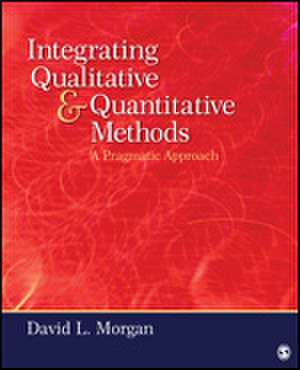Integrating Qualitative and Quantitative Methods: A Pragmatic Approach
Autor David L. Morganen Limba Engleză Paperback – 27 aug 2013
Preț: 366.48 lei
Preț vechi: 699.91 lei
-48% Nou
Puncte Express: 550
Preț estimativ în valută:
70.13€ • 73.37$ • 58.25£
70.13€ • 73.37$ • 58.25£
Carte indisponibilă temporar
Doresc să fiu notificat când acest titlu va fi disponibil:
Se trimite...
Preluare comenzi: 021 569.72.76
Specificații
ISBN-13: 9780761915232
ISBN-10: 0761915230
Pagini: 288
Dimensiuni: 187 x 232 x 15 mm
Greutate: 0.48 kg
Ediția:New.
Editura: SAGE Publications
Colecția Sage Publications, Inc
Locul publicării:Thousand Oaks, United States
ISBN-10: 0761915230
Pagini: 288
Dimensiuni: 187 x 232 x 15 mm
Greutate: 0.48 kg
Ediția:New.
Editura: SAGE Publications
Colecția Sage Publications, Inc
Locul publicării:Thousand Oaks, United States
Recenzii
“Key strengths are clarity of presentation, functional focus, limited technical treatment, practical examples, compact length, emphasis on research design, and the chapter on Pragmatism, which is [a] great way around the paradigm debates that often color the use [of] mixed methods.”
“The research examples are very clear and will help students scope and develop their dissertation designs. . . . A second major strength is the emphasis on examples from program interventions and policy evaluation. This alone makes this text a good alternative textbook in program evaluation.”
“Figures are very clear, discussion of pragmatism is thorough, and the writing style is clear and accessible.”
“The research examples are very clear and will help students scope and develop their dissertation designs. . . . A second major strength is the emphasis on examples from program interventions and policy evaluation. This alone makes this text a good alternative textbook in program evaluation.”
“Figures are very clear, discussion of pragmatism is thorough, and the writing style is clear and accessible.”
Cuprins
Chapter 1. An Introduction and Overview
Chapter 2. Pragmatism as a Paradigm for Mixed Methods Research
Chapter 3. Research Design and Research Methods
Chapter 4. Motivations for Using Mixed Methods Research
Chapter 5. The Sequential Priorities Model
Chapter 6. Preliminary Qualitative Inputs in Quantitative Research Projects
Chapter 7. Preliminary Quantitative Inputs in Core Qualitative Research Projects
Chapter 8. Follow-up Qualitative Extensions in Quantitative Research Projects
Chapter 9. Follow-up Quantitative Extensions in Qualitative Research Projects
Chapter 10. Multipart Sequential Designs
Chapter 11. Finding the Expertise to Combine Multiple Methods
Chapter 12. Conclusions: Further Thoughts About Research Design
Chapter 2. Pragmatism as a Paradigm for Mixed Methods Research
Chapter 3. Research Design and Research Methods
Chapter 4. Motivations for Using Mixed Methods Research
Chapter 5. The Sequential Priorities Model
Chapter 6. Preliminary Qualitative Inputs in Quantitative Research Projects
Chapter 7. Preliminary Quantitative Inputs in Core Qualitative Research Projects
Chapter 8. Follow-up Qualitative Extensions in Quantitative Research Projects
Chapter 9. Follow-up Quantitative Extensions in Qualitative Research Projects
Chapter 10. Multipart Sequential Designs
Chapter 11. Finding the Expertise to Combine Multiple Methods
Chapter 12. Conclusions: Further Thoughts About Research Design
Notă biografică
Descriere
This book is about research designs for projects that collect both qualitative and quantitative data, so that their combined strengths will accomplish more than would have been possible with any one method.
